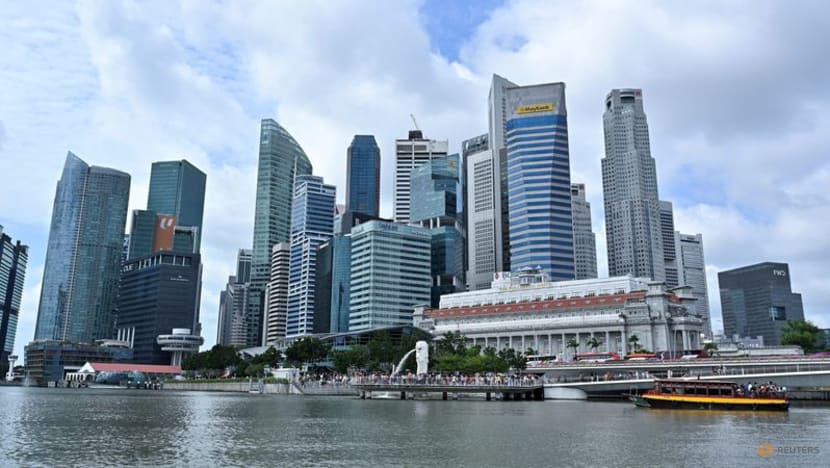Singapore slips in world competitiveness ranking but still top in Asia
The ranking is based on criteria which assess economic performance, government efficiency, business efficiency and infrastructure.

A view of the skyline in Singapore on Jan 27, 2023. (File photo: Reuters/Caroline Chia)
SINGAPORE: Singapore fell one rank to place fourth in a global competitiveness index of 64 economies this year.
The city-state now ranks behind Denmark, Ireland and Switzerland in the annual report, but is still the most competitive in Asia, ahead of Taiwan and Hong Kong.
The ranking by the International Institute for Management Development (IMD) World Competitiveness Center is based on 336 criteria which assess economic performance, government efficiency, business efficiency and infrastructure.
The report said Singapore’s slip in ranking was mainly a result of a slight decline in components within the government efficiency factors, such as competition legislation and adaptability of government policy.
However, the Republic performed well across other indicators, including coming in second in employment, fourth in international investment, and sixth in productivity and efficiency.
The institute’s director Professor Arturo Bris noted that while Singapore has done well in handling the COVID-19 pandemic, the nation’s late reopening – later than most European countries – shaved off some of its competitiveness.
Nevertheless, he stressed the dip was “not significant”, adding that Singapore “remains a very strong competitive economy.”
“This year, with Singapore taking advantage of the recovery, and the resilience of its economy, these are going to pay off,” Prof Bris told CNA’s Singapore Tonight on Tuesday (Jun 20).
The research highlighted that going forward, countries late to open up after the pandemic, including Thailand, Indonesia, and Malaysia are starting to see improvements in their competitiveness. In contrast, those early to open up are beginning to see a decline in ranking.
SMALL BUT MIGHTY
Economies with agile governance and strong trade ties have been the most successful in the latest competitive index.
Top-ranking economies – including Singapore – are small nations that make good use of access to markets and trading partners, the research found.
Second-placed Ireland, for instance, rose sharply through the ranks as a result of robust achievements in its economic performance and significant progress in government and business efficiency.
While Switzerland also slipped a spot to third overall, it still measured strongly across competitive factors, reclaiming its top spot in both government efficiency and infrastructure.
Prof Bris said that small countries allow for easier consensus between the private and the public sectors. He added that Singapore is strong in both physical and intangible infrastructure, particularly in areas of education and healthcare.
“The government also considers the long-term needs of the country much more than the short-term needs,” he said, of factors contributing to the nation’s competitive edge.
“Singapore has invested in human capital, which means that the nation is very well prepared to cope with challenges in the coming years.”
AGILITY AND ADAPTABILITY
While being small is a strength, the size is also a weakness for Singapore as smaller countries are more vulnerable to geopolitical issues, Prof Bris said, highlighting tensions in the South China Sea, and impact from Russia's invasion of Ukraine.
“Singapore operates in the middle of a big market – Asia, and it relies (heavily) on external markets,” he explained.
“Since small economies tend to be affected much more by geopolitical issues, I would say that this is Singapore's biggest weakness.”
Another weakness for Singapore’s competitiveness is its price tag, not unlike fellow small economies such as Hong Kong and Switzerland, Prof Bris said.
“Successful economies are also expensive,” he said. “It is not something that we want to avoid, as it is part of the price of being successful.”
STAYING COMPETITIVE
The report said economies will need to embrace agility and adaptability in order to navigate an increasingly fragmented world.
Hence, Singapore should look at two additional areas of focus to stay competitive, on top of continuing to invest in health, education and digital infrastructure, Prof Bris said.
The first is to boost local produce and production for the domestic market in order to build resilience and work towards self-sufficiency, he said.
Second, is to put a bigger focus on regional cooperation and trade.
“Singapore needs to focus on Southeast Asia because that's going to be the market that will make it profitable, efficient, and successful,” he said.
“Gone are the times when globalisation meant that we can sell equally to (further places such as) Chile or Canada. Now, we will need to focus much more on markets closer to us.”










.jpg?itok=fwLzzZrG)





